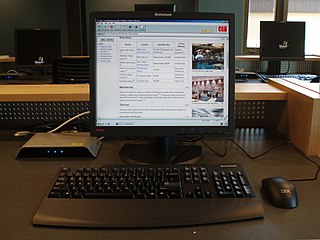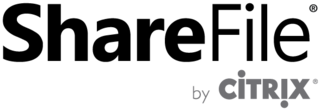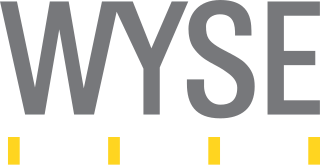
In computer networking, a thin client is a simple (low-performance) computer that has been optimized for establishing a remote connection with a server-based computing environment. They are sometimes known as network computers, or in their simplest form as zero clients. The server does most of the work, which can include launching software programs, performing calculations, and storing data. This contrasts with a rich client or a conventional personal computer; the former is also intended for working in a client–server model but has significant local processing power, while the latter aims to perform its function mostly locally.

Citrix Systems, Inc. is an American multinational cloud computing and virtualization technology company that provides server, application and desktop virtualization, networking, software as a service (SaaS), and cloud computing technologies. Citrix products were claimed to be in use by over 400,000 clients worldwide, including 99% of the Fortune 100, and 98% of the Fortune 500.

Web conferencing is used as an umbrella term for various types of online conferencing and collaborative services including webinars, webcasts, and web meetings. Sometimes it may be used also in the more narrow sense of the peer-level web meeting context, in an attempt to disambiguate it from the other types known as collaborative sessions. The terminology related to these technologies is exact and agreed relying on the standards for web conferencing but specific organizations practices in usage exist to provide also term usage reference.
GoToMyPC is remote desktop software that allows users to access computers remotely using a web browser. It was developed by ExpertCity and launched in 1998. Citrix Systems acquired ExpertCity in 2004 and maintained the GoToMyPC brand and services. Citrix spun off the GoTo products, which were acquired by LogMeIn in early 2017. There are three versions: "Personal", "Pro", and "Corporate".
Desktop virtualization is a software technology that separates the desktop environment and associated application software from the physical client device that is used to access it.

GoTo Meeting is a web conferencing software by GoTo. It is an online meeting, desktop sharing, and video conferencing software package that enables the user to meet with other computer users, customers, clients, or colleagues via the Internet in real time. In late 2015, Citrix announced plans to spin off the GoTo Meeting business as a standalone subsidiary with a market value around $4 billion. In July 2016, Citrix and LogMeIn announced plans to merge the GoTo family of products.
Oracle Secure Global Desktop (SGD) software provides secure access to both published applications and published desktops running on Microsoft Windows, Unix, mainframe and IBM i systems via a variety of clients ranging from fat PCs to thin clients such as Sun Rays.
Paglo was an information technology management software as a service company that provided a search engine for IT and logs. It was designed for IT professionals and Managed Service Providers (MSPs), and it allowed them to discover all of their IT data and solve computer, network, and user problems. The company was launched on November 19, 2007. It was bought by Citrix Online.

ShareFile is a secure content collaboration, file sharing and sync software that supports all the document-centric tasks and workflow needs of small and large businesses. The company also offers cloud-based or on-premises storage, virtual data rooms and client portals. ShareFile is owned by Citrix Systems.
Remote Desktop Services (RDS), known as Terminal Services in Windows Server 2008 and earlier, is one of the components of Microsoft Windows that allow a user to initiate and control an interactive session on a remote computer or virtual machine over a network connection. RDS was first released in 1998 as Terminal Server in Windows NT 4.0 Terminal Server Edition, a stand-alone edition of Windows NT 4.0 Server that allowed users to log in remotely. Starting with Windows 2000, it was integrated under the name of Terminal Services as an optional component in the server editions of the Windows NT family of operating systems, receiving updates and improvements with each version of Windows. Terminal Services were then renamed to Remote Desktop Services with Windows Server 2008 R2 in 2009.

GoTo, formerly LogMeIn Inc., is a flexible-work provider of software as a service (SaaS) and cloud-based remote work tools for collaboration and IT management, with products including GoTo Connect, GoTo Resolve, Rescue, Central, and more, built for small and midsized business IT departments but powerful enough for the enterprise. The company was founded in 2003 and based in Boston, Massachusetts, and rebranded from LogMeIn to GoTo on February 2, 2022. The rebrand to GoTo comes with a simplified product portfolio to a single application and two flagship products: the IT management and support product, GoTo Resolve, and a new experience for the unified-communications-as-a-service (UCaaS) product, GoTo Connect. These products are unified by a single application, administrative system, and converging user experience.
CrossLoop was a remote desktop service from CrossLoop Inc., which allowed users to share their computer screens and collaborate with others over the Internet.

Netviewer AG was a German IT company headquartered in Karlsruhe. The company's software products provide web conferencing, desktop sharing, and remote maintenance capabilities. According to market research companies Frost & Sullivan and Gartner, Netviewer is among the leading European providers of web conferencing software. As of 2009, the firm employed more than 200 people at nine locations in Europe and served more than 15,000 corporate customers in 55 countries.
XenClient is a discontinued desktop virtualization product developed by Citrix that runs virtual desktops on endpoint devices. The product reached end of-life in December 2016. Desktops are run locally, without hosting applications or the operating system in a datacenter. It consists of a Type-1 Xen client hypervisor and a management server, which provides features such as centralized provisioning, patching, updating, monitoring, policy controls, and de-provisioning. It enforces security through features including AES-256 full disk encryption, VM isolation, remote kill, lockout, USB filtering, and VLAN tagging. XenClient supports use cases such as disconnected operation on laptops, limited connectivity environments, and other use cases where use of local execution is desired and centralized management is required.

Wyse Technology, often shortened to Wyse, was an independent American manufacturer of cloud computing systems. As of 2012, Wyse is a subsidiary of Dell. Wyse are best remembered for their video terminal line introduced in the 1980s, which competed with the market-leading Digital. They also had a successful line of IBM PC compatible workstations in the mid-to-late 1980s. But starting late in the decade, Wyse were outcompeted by companies such as eventual parent Dell. Current products include thin client hardware and software as well as desktop virtualization solutions. Other products include cloud software-supporting desktop computers, laptops, and mobile devices. Dell Cloud Client Computing is partnered with IT vendors such as Citrix, IBM, Microsoft, and VMware.
Founded by Alex Vasilevsky, Virtual Computer was a venture-backed software company in the Boston area that produces desktop virtualization products, which combine centralized management with local execution on a hypervisor running on PCs. By running the workload on the PC, Virtual Computer enables companies to have centralized management without servers, storage, and networking required for server-hosted VDI.
GoTo Resolve is a cloud-based remote support platform designed and targeted at IT support teams and customer support organizations. In 2018, LogMeIn's GoToAssist was rebranded to RescueAssist creating the Rescue brand of support products.
AnyMeeting, Inc. is a provider of web conferencing and webinar services for small business that enables users to host and attend web based conferences and meetings and share their desktop screen with other remote users via the web. AnyMeeting is a web-based software application accessible by users via a web browser. This method of software delivery is commonly referred to as Software as a Service. The company was founded in 2011 and backed by Keiretsu Forum angel investors.
Podio supplies a web-based platform for creating no code solutions and automated workflows. The feature set includes organizing team communication, business processes, data and content in project management workspaces according to project needs.








